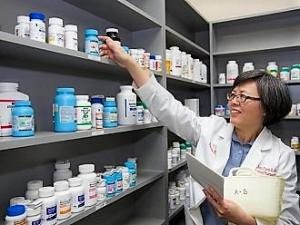Does Eating Organic Matter? Pharmacist And Nutrition Guru Dr. Navid Vahedi Explains
LOS ANGELES, CA, UNITED STATES, October 1, 2020 /EINPresswire.com/ -- Like many people, you want the healthiest foods possible for your family... but you don't want to spend a fortune. Good news: according to pharmacist and health guru Dr. Navid Vahedi, you don't have to go organic all the time in order to eat healthy.
First, Dr. Navid Vahedi says that it's important to get a handle on what it means for food to be grown organically. The USDA has strict standards for organic foods, and regularly tests the soil in the areas in which organic foods are grown. The soil must be free of most synthetic fertilizers and pesticides, and the crops cannot be genetically modified. Organically grown foods are also better for the environment, as they add fewer chemicals to the soil. Organic farms are often also committed to animal wellness and sustainable farming practices.
Dr. Navid Vahedi explains that going organic for certain foods is more important than others. Organic foods are often more expensive than traditionally grown foods, so if you're on a budget, Dr. Navid Vahedi recommends sticking organic items for a handful of foods, while sticking to conventionally grown options for others.
Dr. Navid Vahedi recommends paying attention to the dirty dozen when it comes to choosing the foods that are most important to choose the organic option whenever it's available. The dirty dozen refers to a list of foods that are most likely to harbor pesticides and fertilizers than other produce. The dirty dozen list includes hot peppers, potatoes, celery, tomatoes, peaches, cherries, pears, grapes, apples, nectarines, kale, spinach, and strawberries. Dr. Navid Vahedi advises that you choose organic dirty dozen items whenever possible.
It's also important to pay attention to the clean fifteen, according to Dr. Navid Vahedi. When buying these foods, it's ok to choose conventional over organic, as these items are less likely to hang onto pesticides and fertilizers. The clean fifteen include honeydew, mushrooms, cantaloupe, broccoli, cauliflower, kiwis, cabbage, asparagus, papayas, eggplant, onions, frozen peas, avocados, corn, and pineapples. It's still important to wash these fruits and vegetables carefully, even though they're not as likely to harbor chemicals acquired during the farming process.
Of course, Dr. Navid Vahedi recommends eating produce whenever possible, even if eating organic isn't an option. The health benefits of fruits and vegetables are there whether you choose to eat organically or not. Eating a diet rich in conventionally grown produce beats a diet loaded with organic junk food, no question. Dr. Navid Vahedi advises that you focus on ensuring that your family is getting at least five servings of fruits and vegetables each day, whether you choose to eat organic or not.

First, Dr. Navid Vahedi says that it's important to get a handle on what it means for food to be grown organically. The USDA has strict standards for organic foods, and regularly tests the soil in the areas in which organic foods are grown. The soil must be free of most synthetic fertilizers and pesticides, and the crops cannot be genetically modified. Organically grown foods are also better for the environment, as they add fewer chemicals to the soil. Organic farms are often also committed to animal wellness and sustainable farming practices.
Dr. Navid Vahedi explains that going organic for certain foods is more important than others. Organic foods are often more expensive than traditionally grown foods, so if you're on a budget, Dr. Navid Vahedi recommends sticking organic items for a handful of foods, while sticking to conventionally grown options for others.
Dr. Navid Vahedi recommends paying attention to the dirty dozen when it comes to choosing the foods that are most important to choose the organic option whenever it's available. The dirty dozen refers to a list of foods that are most likely to harbor pesticides and fertilizers than other produce. The dirty dozen list includes hot peppers, potatoes, celery, tomatoes, peaches, cherries, pears, grapes, apples, nectarines, kale, spinach, and strawberries. Dr. Navid Vahedi advises that you choose organic dirty dozen items whenever possible.
It's also important to pay attention to the clean fifteen, according to Dr. Navid Vahedi. When buying these foods, it's ok to choose conventional over organic, as these items are less likely to hang onto pesticides and fertilizers. The clean fifteen include honeydew, mushrooms, cantaloupe, broccoli, cauliflower, kiwis, cabbage, asparagus, papayas, eggplant, onions, frozen peas, avocados, corn, and pineapples. It's still important to wash these fruits and vegetables carefully, even though they're not as likely to harbor chemicals acquired during the farming process.
Of course, Dr. Navid Vahedi recommends eating produce whenever possible, even if eating organic isn't an option. The health benefits of fruits and vegetables are there whether you choose to eat organically or not. Eating a diet rich in conventionally grown produce beats a diet loaded with organic junk food, no question. Dr. Navid Vahedi advises that you focus on ensuring that your family is getting at least five servings of fruits and vegetables each day, whether you choose to eat organic or not.
Caroline Hunter
Web Presence, LLC
+1 786-233-8220
email us here
Legal Disclaimer:
EIN Presswire provides this news content "as is" without warranty of any kind. We do not accept any responsibility or liability for the accuracy, content, images, videos, licenses, completeness, legality, or reliability of the information contained in this article. If you have any complaints or copyright issues related to this article, kindly contact the author above.

